Is Web Scraping Legal? the Comprehensive Guide for 2025

Lucas Mitchell
Automation Engineer
24-Jan-2025

Web scraping has become an essential tool for businesses, researchers, and developers. From gathering data for analysis to monitoring competitors, the use cases are vast. However, one question that often arises is: Is web scraping legal? The answer isn't straightforward and depends on multiple factors, including the region, the purpose of scraping, and how it is carried out.
In this article, we’ll explore the legal landscape of web scraping in 2025, providing a detailed overview of global laws and compliance considerations. We’ll also touch upon how CAPTCHA solvers, like CapSolver, play a role in the web scraping ecosystem and their legal implications.
What is Web Scraping?
Web scraping refers to the automated process of extracting data from websites. It enables users to collect and organize information from webpages into a structured format, such as a spreadsheet or database.
The process typically involves sending an HTTP request to a website, retrieving its HTML content, and parsing it to extract the desired data. Developers often rely on programming languages like Python, JavaScript, or PHP, along with libraries and frameworks such as BeautifulSoup, Scrapy, or Playwright, to streamline this process.
Web scraping is widely used for various purposes, such as:
- Market Research: Tracking competitors' product prices and trends.
- Data Aggregation: Compiling information from multiple sources into a single database.
- SEO Monitoring: Analyzing keywords and search engine rankings.
Can Web Scraping Be Detected?
The Answer is YES, web scraping can often be detected, especially by websites employing sophisticated anti-scraping technologies. Detection mechanisms are designed to identify unusual patterns or behaviors that deviate from normal human activity. Here are some common methods websites use to detect web scraping:
- Behavioral Analysis
Websites monitor visitor behavior, such as the speed of navigation, frequency of requests, or repetitive actions. Bots often operate faster than human users, making their activity more predictable and easier to identify.
- IP Address Monitoring
Repeated requests from the same IP address can raise suspicion. Websites may use rate-limiting or IP blacklisting to block suspected scraping activities.
- Use of CAPTCHA
CAPTCHAs are commonly deployed to differentiate between bots and human users. When triggered, they present challenges that automated scraping tools often struggle to solve without human intervention or specialized CAPTCHA-solving solutions.
- Device and Browser Fingerprinting
Websites analyze browser headers, screen resolution, and device information to detect discrepancies or anomalies that indicate the use of bots or headless browsers.
- Robots.txt and Honeypots
Websites include instructions in their robots.txt files to restrict certain areas from automated access. Additionally, honeypot traps (hidden elements) are used to catch bots attempting to scrape restricted data.
Mitigating Detection Risks
If web scraping is performed, it's crucial to use compliant methods, such as:
- Rotating proxies to distribute requests.
- Respecting robots.txt guidelines.
- Avoiding high-frequency requests that could trigger alarms.
- Using CAPTCHA solvers like CapSolver responsibly and within legal frameworks to handle authentication challenges.
Staying mindful of detection methods and adhering to ethical practices ensures a balance between data collection and respecting website policies.
Is Web Scraping Legal? A General Overview
The legality of web scraping largely depends on:
- The type of data being scraped.
- The intent behind the scraping activity.
- The methods used to access the data.
- The Type of Data Being Scraped
The nature of the data plays a significant role in determining legality. Publicly available data, such as information listed on open websites, is generally safer to scrape. However, scraping sensitive, personal, or proprietary data—like user accounts or copyrighted material—without authorization can lead to legal consequences under privacy and intellectual property laws.
- The Intent Behind the Scraping Activity
The purpose of web scraping is another determining factor. Scraping for legitimate and ethical purposes, such as academic research or personal use, is less likely to face legal challenges. Conversely, using scraped data for malicious purposes—such as spamming, fraud, or competitive sabotage—violates ethical and legal standards, leading to potential legal disputes.
- The Methods Used to Access the Data
How the data is accessed also affects the legality of web scraping. Using automated tools to bypass anti-scraping mechanisms or violating a website’s terms of service (e.g., ignoring a robots.txt file) can lead to claims of unauthorized access under laws like the U.S. Computer Fraud and Abuse Act (CFAA).
What About Web Scraping Around the World?
The legal landscape of web scraping varies significantly depending on the region, the type of data being accessed, and the applicable laws. Below is an overview of the regulations in key regions and what you should be aware of when engaging in web scraping activities.
United States
In the United States, web scraping is generally legal when it involves publicly available data. However, care must be taken when accessing data that is password-protected, proprietary, or falls under privacy laws. U.S. laws related to web scraping include:
- California Consumer Privacy Act (CCPA): Protects consumer data by granting individuals the right to know, delete, or restrict the sale of their personal information. If your web scraping collects personal data, compliance with this law is essential.
- Computer Fraud and Abuse Act (CFAA): This law makes unauthorized access to computers and networks illegal. Even scraping publicly available data could result in legal disputes if terms of service (ToS) are violated.
- Copyright Law: Protects intellectual property. Copying and redistributing copyrighted material without permission could lead to infringement claims.
European Union
The European Union has strict regulations governing personal and proprietary data. While scraping publicly accessible information is generally permissible, web scrapers must ensure compliance with the following laws:
- General Data Protection Regulation (GDPR): A cornerstone regulation in the EU that protects personal data and user privacy. Any scraping activity involving personal data must have a lawful basis and adhere to GDPR principles like data minimization and transparency.
- Database Directive: Protects databases that required substantial investment to compile, meaning that even if the data is public, scraping it may infringe on database rights.
- Digital Single Market Directive: Aims to modernize copyright rules and ensure fair compensation for rights holders in the digital economy, potentially impacting certain scraping activities.
United Kingdom
Web scraping laws in the UK are largely aligned with EU regulations, but there are specific national laws to consider:
- Data Protection Act (DPA): Similar to the GDPR, it regulates the collection, storage, and use of personal data.
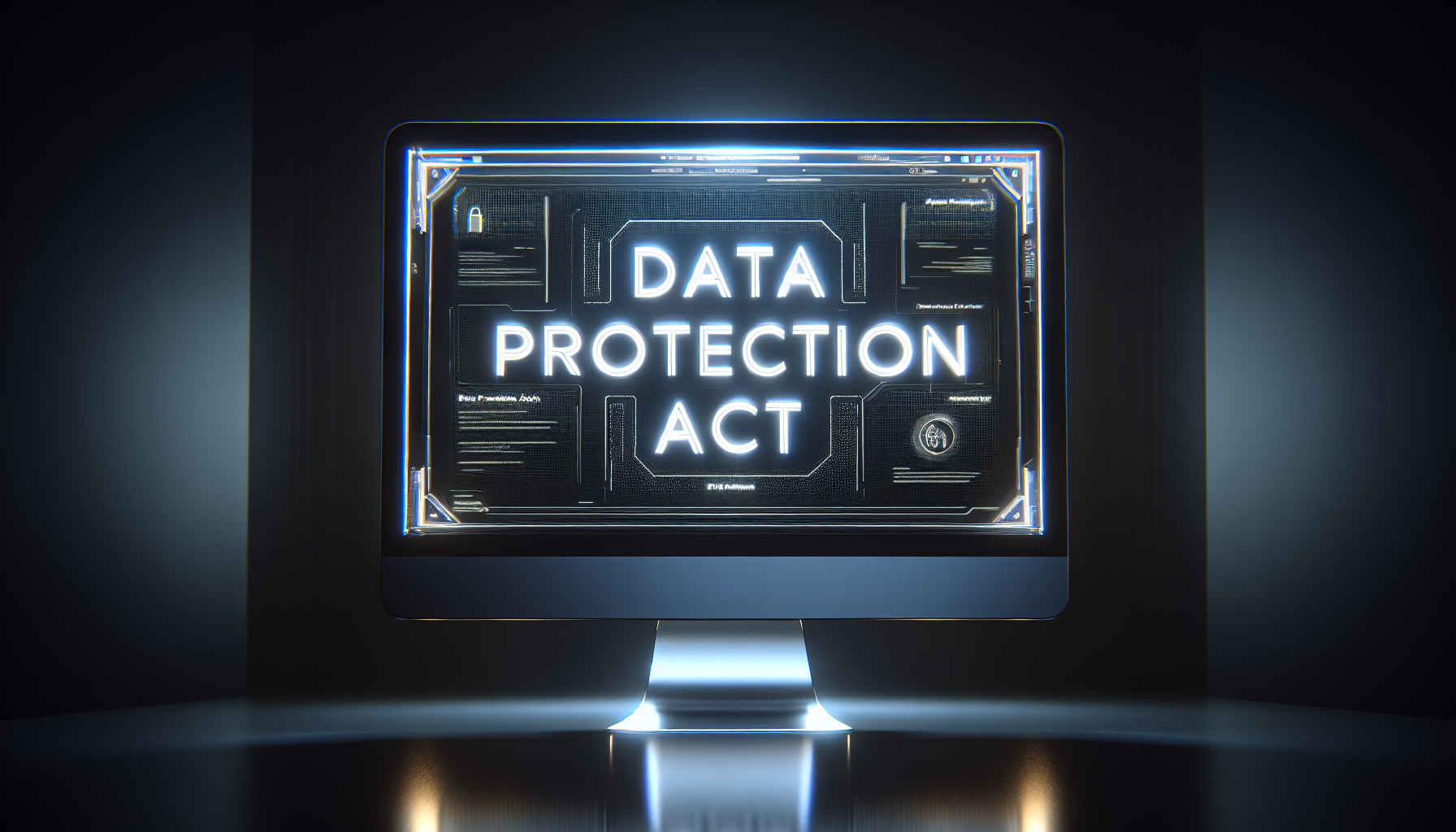
- Copyright, Designs and Patents Act: Protects creative works, including databases and digital content, against unauthorized use.
- Computer Misuse Act: Penalizes unauthorized access to systems, which could be relevant if scraping breaches website security or terms of service.
Regional Comparison of Web Scraping Laws
| Region | Public Data Scraping | Restrictions on Personal Data | Key Regulations |
|---|---|---|---|
| United States | Generally allowed | Requires compliance with CFAA | CCPA, CFAA, Copyright Law |
| European Union | Permitted under limits | Strictly regulated under GDPR | GDPR, Database Directive, Digital Directive |
| United Kingdom | Similar to EU | Aligns with GDPR and DPA | DPA, Copyright Act, CMA |
Key Takeaways
Regardless of the region, web scraping involves navigating a complex legal landscape. The primary factors to consider include:
- Whether the data is publicly accessible or protected by login.
- If personal or sensitive data is involved.
- Whether scraping violates terms of service, intellectual property rights, or specific regional laws.
By understanding and complying with the regulations in your target region, you can ensure that your web scraping activities remain lawful and ethical.
Common Legal Risks of Web Scraping
While web scraping offers immense value, it is not without its legal challenges. Understanding and mitigating these risks is crucial to conducting scraping activities lawfully.
One of the primary risks is violating a website’s Terms of Service (ToS). Many websites explicitly prohibit automated data collection in their ToS, and breaching these agreements can result in legal disputes, even if the data being scraped is publicly accessible. This is particularly sensitive when the scraped data includes proprietary information or forms a critical part of the website’s business model.
Another major concern is unauthorized access. If scraping activities bypass login requirements, CAPTCHA challenges, or other security measures, they may be considered unauthorized access under laws such as the Computer Fraud and Abuse Act (CFAA) in the United States or the Computer Misuse Act in the UK. These laws treat bypassing technical barriers as a violation, regardless of whether the data itself is public.
Intellectual property (IP) infringement also poses significant risks. Many websites contain copyrighted content or databases that are protected under regional copyright laws or database directives. Extracting and redistributing such data without proper authorization could result in claims of copyright or database rights infringement, especially if the data is used commercially or shared publicly.
Finally, privacy violations are a critical issue. Collecting personal data, such as email addresses, phone numbers, or other user-specific information, without consent can breach privacy regulations like the General Data Protection Regulation (GDPR) in the EU or the California Consumer Privacy Act (CCPA) in the US. These laws require explicit consent for processing personal data, even if it is available online.
Examples of Legal Web Scraping Use Cases
Despite these risks, web scraping can be perfectly legal when conducted responsibly and within regulatory boundaries. Here are some common scenarios where web scraping is both lawful and beneficial:
-
Market Research and Price Monitoring
Collecting publicly available product prices from e-commerce websites to analyze market trends is a widely accepted use case. For example, businesses often track competitors' pricing strategies to optimize their own offerings, provided they do not bypass anti-scraping mechanisms or misuse proprietary information. -
Public Data Aggregation
Scraping government or public databases, such as weather reports, stock market data, or public tenders, is typically legal as this information is meant to be freely accessible to the public. Researchers and developers often use this data to build analytical tools or informative dashboards. -
Academic Research
Web scraping for educational or non-commercial purposes, such as analyzing social media trends or studying the impact of digital content, is usually considered fair use, especially when the data is anonymized and complies with applicable privacy regulations. -
SEO Optimization and Analytics
Extracting publicly visible metadata, such as keywords or ranking information, from search engine results pages (SERPs) to improve website performance is another common and accepted practice.
Best Practices to Stay Compliant
To ensure your web scraping activities remain lawful, consider adopting these best practices:
- Respect Website Policies: Always review and adhere to a website’s Terms of Service before initiating scraping activities.
- Focus on Publicly Available Data: Avoid accessing restricted or sensitive data, such as content behind a login page or protected by paywalls.
- Use Data Responsibly: Do not use scraped data for unethical purposes, such as spamming, plagiarism, or deceptive activities.
- Anonymize Personal Data: If scraping involves user-generated content, ensure personal identifiers are anonymized to comply with privacy laws.
CapSolver: Supporting Ethical Web Scraping
CapSolver is dedicated to providing solutions for legal and compliant web scraping scenarios, helping users navigate CAPTCHA challenges while staying compliant. We adhere to international regulations and ensure that businesses can gather the data they need without violating website terms of service.
With CapSolver, companies can focus on data collection without worrying about the obstacles or risks posed by CAPTCHA challenges.
Conclusion
The legality of web scraping depends on factors such as the type of data, the purpose of scraping, and the methods used to access information. While risks like violating ToS, IP infringement, or privacy laws exist, they can be mitigated by adhering to ethical practices and regional regulations. By staying informed about the legal landscape and respecting the boundaries set by websites and laws, web scraping can be a powerful tool for innovation and growth in 2025.
FAQ
Is web scraping legal in the USA?
Web scraping can be legal in the USA if conducted responsibly and within the framework of laws such as the Computer Fraud and Abuse Act (CFAA). It's essential to ensure compliance with other applicable laws and respect a website’s Terms of Service.
Is it legal to scrape job postings?
Scraping job postings is typically legal if the information is publicly accessible. However, one must ensure no laws or terms of service governing the target website or the gathered data are violated.
Is web scraping legal for commercial purposes?
Web scraping for commercial use can be legal, provided it adheres to relevant laws that govern the target website, the data being scraped, and the purpose of the scraping activity. Proper compliance with privacy regulations and terms of service is essential.
Is web scraping legal in Europe?
In Europe, web scraping may be legal if the activity complies with regulations such as the General Data Protection Regulation (GDPR) and other region-specific laws. It's crucial to respect privacy and intellectual property laws while scraping data.
Compliance Disclaimer: The information provided on this blog is for informational purposes only. CapSolver is committed to compliance with all applicable laws and regulations. The use of the CapSolver network for illegal, fraudulent, or abusive activities is strictly prohibited and will be investigated. Our captcha-solving solutions enhance user experience while ensuring 100% compliance in helping solve captcha difficulties during public data crawling. We encourage responsible use of our services. For more information, please visit our Terms of Service and Privacy Policy.
More
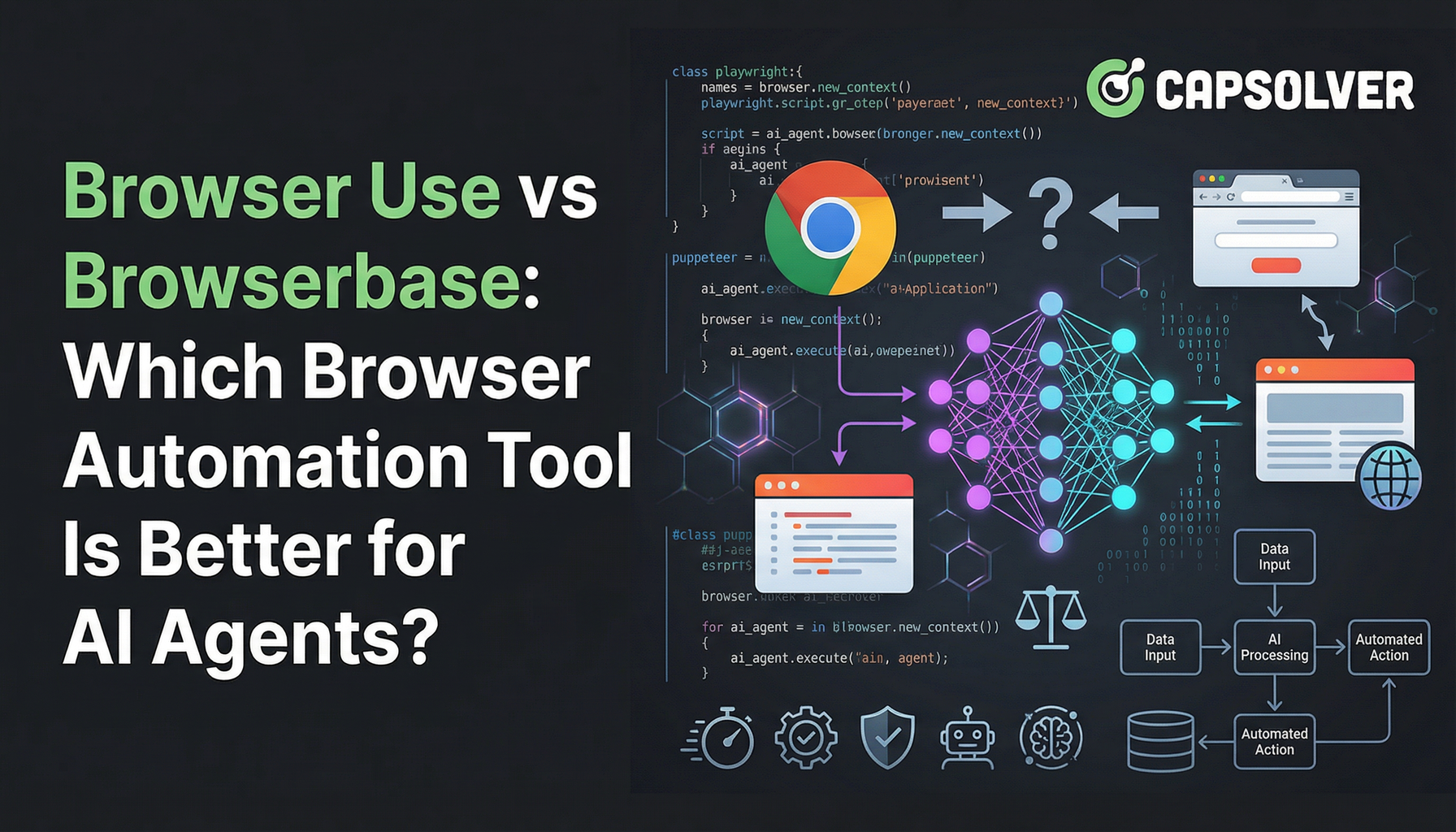
Browser Use vs Browserbase: Which Browser Automation Tool Is Better for AI Agents?
Compare Browser Use vs Browserbase for AI agent automation. Discover features, pricing, and how to solve CAPTCHAs with CapSolver for seamless workflows.

Anh Tuan
27-Jan-2026
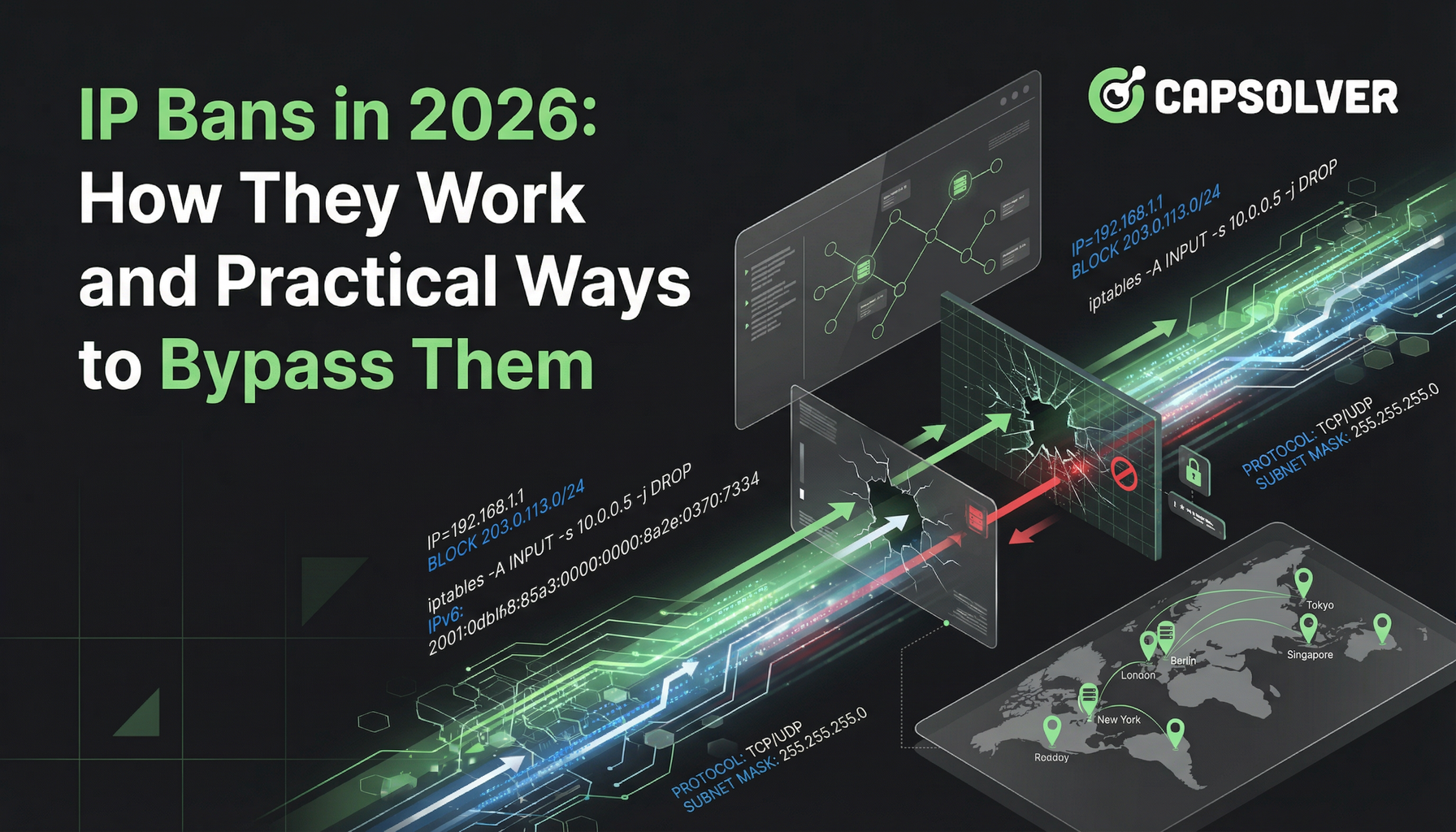
IP Bans in 2026: How They Work and Practical Ways to Bypass Them
Learn how to bypass ip ban in 2026 with our comprehensive guide. Discover modern IP blocking techniques and practical solutions like residential proxies and CAPTCHA solvers.

Lucas Mitchell
26-Jan-2026

How to Solve Captcha in Pydoll with CapSolver Integration
Learn how to solve reCAPTCHA and Cloudflare Turnstile in Pydoll using CapSolver for stealthy, async, CDP-based browser automation.

Lucas Mitchell
23-Jan-2026
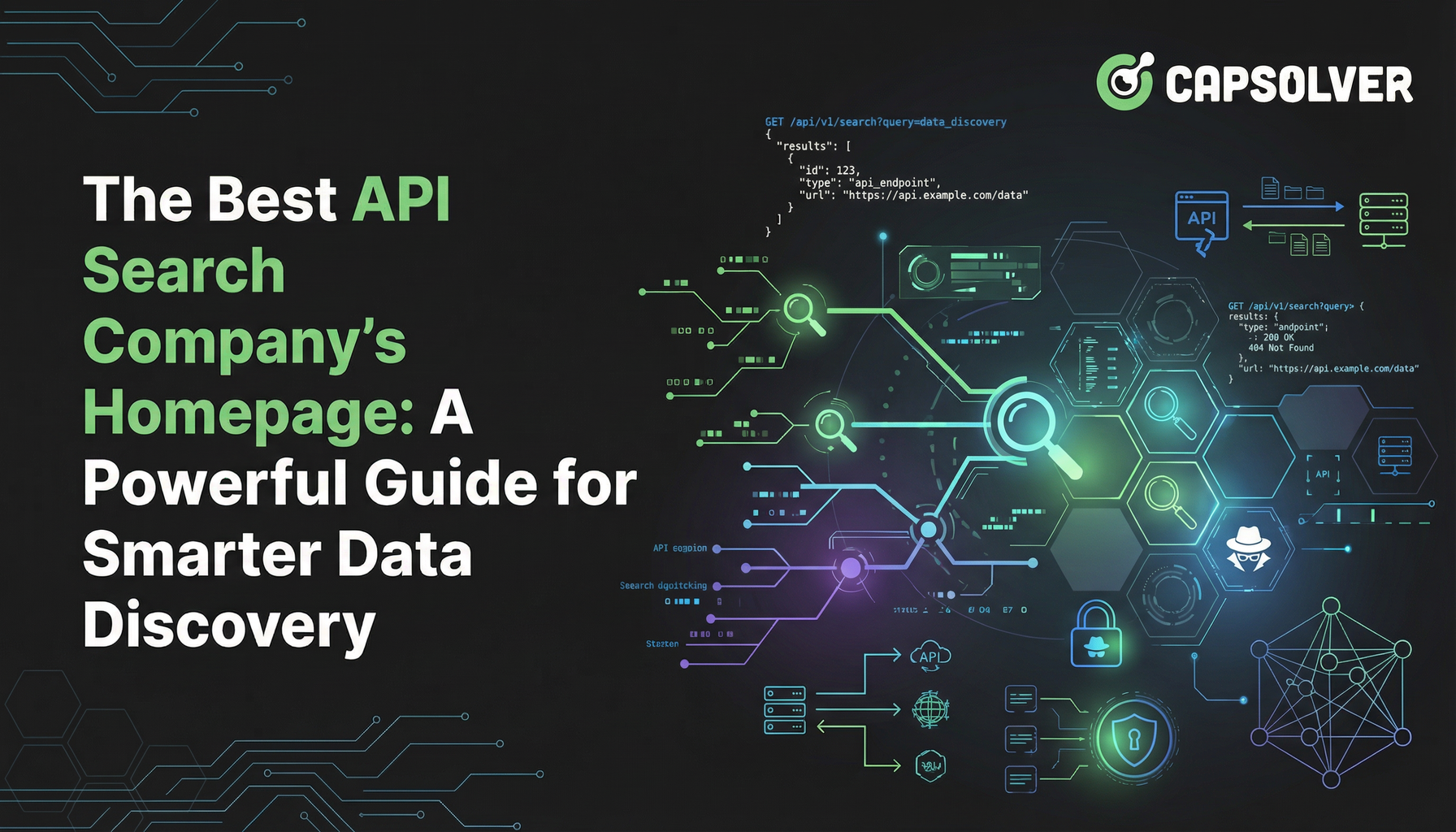
The Best API Search Company’s Homepage: A Powerful Guide for Smarter Data Discovery
Evaluate the best api search company's homepage with our expert guide. Learn to assess technical transparency, developer experience, and core features for smarter data discovery and reliable API integration.

Nikolai Smirnov
23-Jan-2026
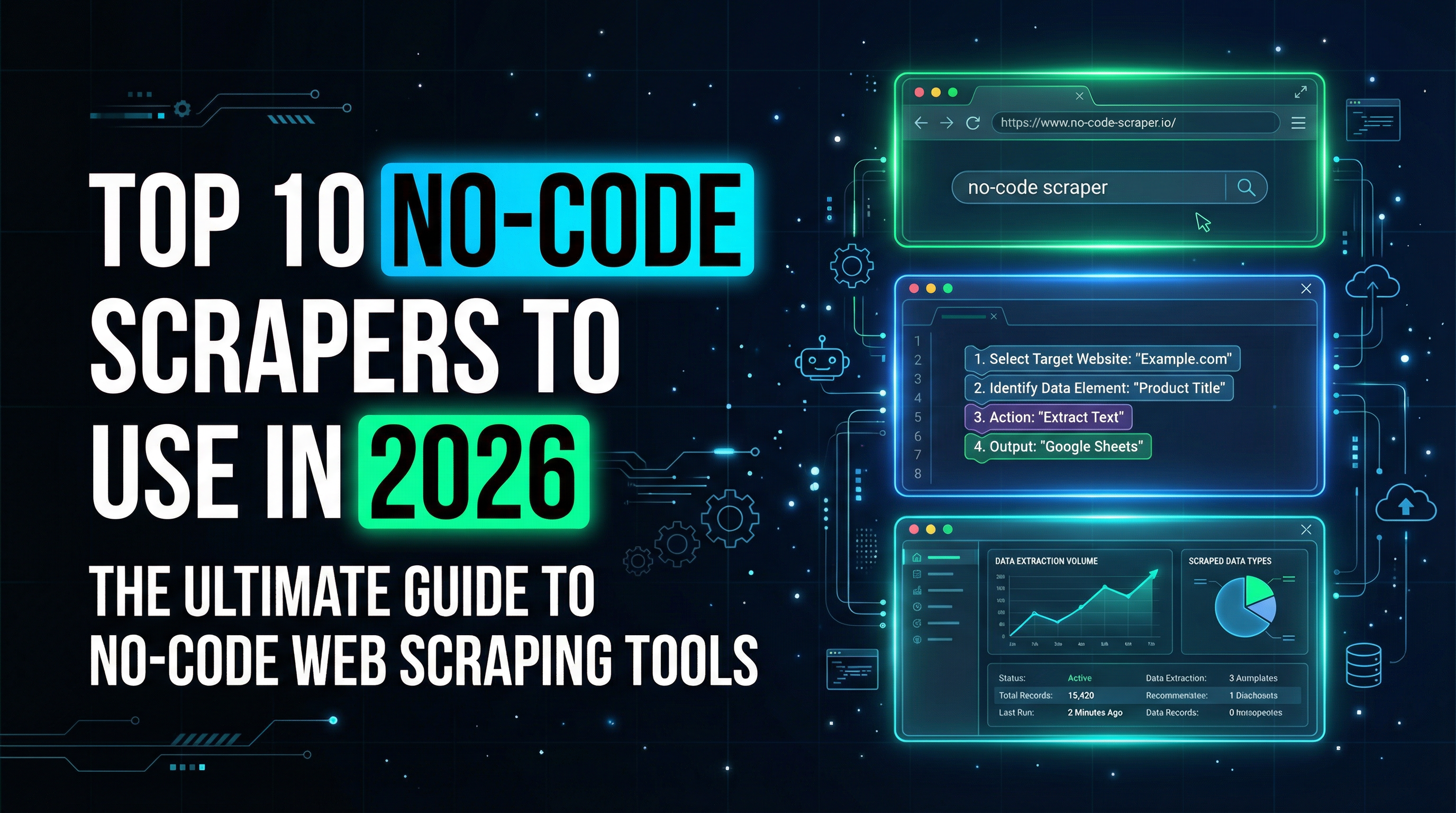
Top 10 No-Code Scrapers to Use in 2026
A curated list of the best no-code web scraping tools to use in 2026. Compare AI-powered scrapers, visual point-and-click platforms, pricing, pros and cons, and real-world use cases.

Lucas Mitchell
21-Jan-2026
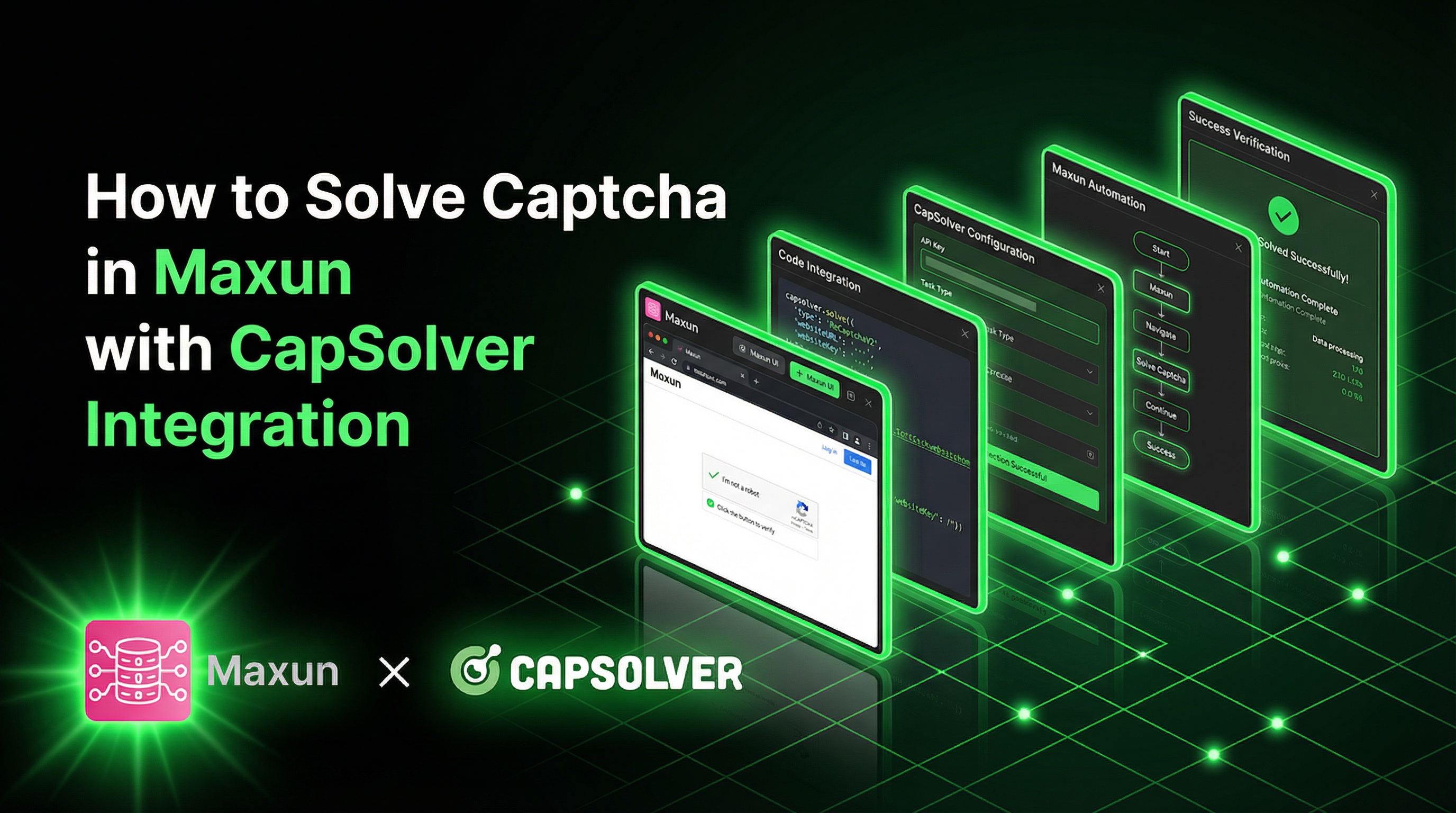
How to Solve Captcha in Maxun with CapSolver Integration
A practical guide to integrating CapSolver with Maxun for real-world web scraping. Learn how to handle reCAPTCHA, Cloudflare Turnstile, and CAPTCHA-protected sites using pre-auth and robot workflows.

Ethan Collins
21-Jan-2026

